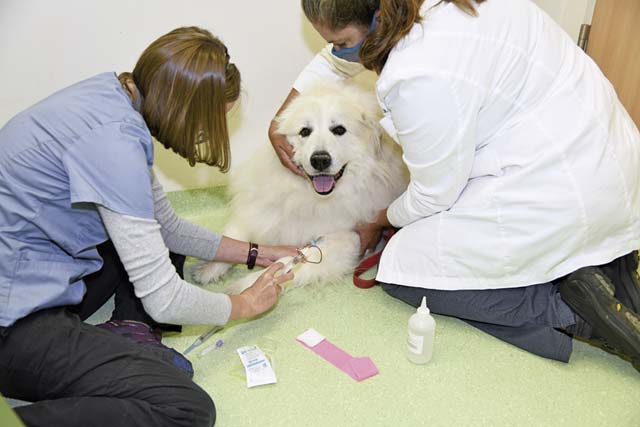
Stuttgart Veterinary Treatment Facility
Moving to an overseas installation can be stressful for pets. What will their life in Stuttgart be like? What is veterinary care like? Are there dog parks? Can pets go downtown, into public places, or travel with the family on vacation? For those with four-legged family members to consider, the following tips may make the transition easier for all involved, even the family pet.
Finding veterinary care providers
Upon arrival to Stuttgart, finding suitable veterinary care is simple. The Stuttgart Veterinary Treatment Facility offers space-available routine annual exams and services, non-emergency sick call exams, dental and surgical procedures, and over-the-counter pet health product sales. It is NOT an emergency clinic. Service members, DOD civilians, and family members are authorized to bring their pets to the clinic. For some families, it is more convenient to have their pet seen at a host nation veterinary clinic.
Here in Stuttgart, pet owners can find several great clinics in the local area, including 24-hour emergency facilities, specialty hospitals where pets can receive advanced diagnostic and surgical care, and some excellent general practice veterinary clinics. Many German veterinarians speak English, so there is no need to worry about a language barrier disrupting a pet’s medical care, and many also accept the VAT form. In addition to veterinary clinics, Stuttgart also has a good selection of boarding facilities, pet stores, and dog groomers.
Know the rules
Living with pets in Germany can be a rewarding experience, as many local businesses allow well-behaved dogs inside their establishments.
There are some laws governing animal ownership that might be new to people coming from the U.S. Certain breeds (for example, American Staffordshire terriers and bull terriers) are completely banned from entering Germany, and those attempting to import them can be fined or imprisoned while the animal can be deported or seized. Other breeds are restricted, meaning that they are permitted to be in Germany, but special precautions could be required, such as the dog wearing a muzzle when in public, undergoing temperament evaluation, or the owner may be required to take out a special liability insurance policy on the pet. The list of breeds varies by city and state, so owners are encouraged to contact their local German town halls for additional information.
It is important for American personnel to understand that traditionally, pets in Germany have a high level of obedience training. Many regular pet owners, not just hobby pet-show competitors, take their dogs to a number of extensive training sessions. Obedience training is offered by several local dog clubs and many of the members speak English. Pets are often expected to be as self-disciplined and quiet as a very well-behaved child. An out of control pet is looked down upon in Germany. Additionally, leash laws and other pet-related ordinances in Germany can be more extensive and vary from town-to-town or county-to-county. Again, the local German town hall can be a good source of information on local ordinances and pet clubs that offer training.
Traveling with a pet
Pet owners looking to travel with their pet while in Europe may be surprised to find just how easy and fun it can be. Within the European Union, an EU pet passport has been established that contains the pet’s vaccination records. As long as the vaccines are up-to-date and it contains all the necessary information, this passport allows the pet to move with the owner through most nations of the EU with ease.
EU pet passports are highly recommended as they greatly simplify the vacation travel process and help alleviate stress. A pet passport can only be obtained by an EU veterinarian at a host nation clinic. The Stuttgart Veterinary Treatment Facility does not have an EU veterinarian, and they cannot issue an EU pet passport.
The official blue EU pet passport (with EU logo) should not be confused with the various other unofficial or country-specific pet passports that many clinics may also carry.
Stuttgart Vet Clinic contact information
- DSN: 314-590-1888
- CIV: +49 (0)6371-9464-1888
- Email: usarmy.rheinland-pfalz.medcom-ph-e.mbx.vtf-stuttgart@health.mil
- Garrison webpage: https://home.army.mil/stuttgart/vet-clinic
